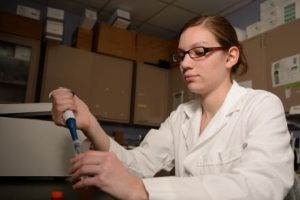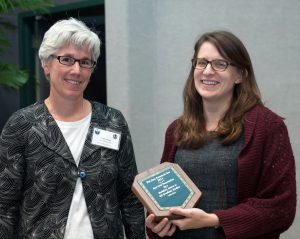Eliminating blinding progressive retinal atrophy in Papillon dogs

Paige Winkler has been recognized with a 2015 Genetics Program Outstanding Student of the Year Award, given annually to two graduate students in the Michigan State University Genetics Program Paige Winkler is a genetic program PhD student in the Petersen-Jones lab. Her research successes include the identification of the gene mutations responsible for progressive retinal atrophy (PRA) in Papillons and albinism in Doberman Pinschers. As a result of her finding, genetic testing for PRA in the Papillon was developed and was provided for breeders initially from the Petersen-Jones lab and subsequently through a commercial testing company. This test gives breeders the opportunity to eliminate this important cause of blindness from the Papillon breed. Winkler has continued studies of retinal dystrophies in Papillons aiming to identify the genetic causes of two additional retinal disorders identified by the Petersen-Jones lab in their studies of retinal function in the breed. She is further characterizing the effects of the PRA-causing gene mutation that she identified and has shown that it also has an effect on the affected dogs’ sense of smell. The group is also developing a gene therapy treatment of the condition that may be translatable to human patients who develop blindness due to mutations in the equivalent human gene.
Restoring vision to dogs blinded by Leber Congenital Amaurosis

Dr. Freya Mowat has been awarded one of the two residents’ awards given annually by the American Association of Veterinary Clinicians (AAVC). The award is given to individuals who have achieved a high degree of excellence in four categories: clinical service, clinical teaching, client communications, and research.
Mowat recently completed a combined postdoctoral program in the Petersen-Jones lab and a comparative ophthalmology residency. Her research work has provided important insights into gene therapy for Leber Congenital Amaurosis (LCA) due to mutations in the RPE65 gene. The same gene therapy vector that is being used to treat human patients was used to successfully restore vision to dogs who have a mutation of the same gene. The findings of the study in dogs have important implications for the treatment of LCA in humans. It is the most common inherited cause of blindness in childhood. This work was part of a collaboration between scientists at University College London (where Mowat completed her PhD) who are running the first human clinical trial for LCA caused by RPE65 mutations in people, the Petersen-Jones lab, and Dr Debra Thompson’s lab at the Kellogg Eye Center, University of Michigan. Freya was jointly funded by the Myers-Dunlap Endowment, the Glassen Family Foundation, and University College London. She will be presenting her latest findings as a paper at the Association for Research in Vision and Ophthalmology meeting May 2015. Mowat began her clinical training as a European College of Veterinary Ophthalmologists (ECVO) resident under the mentorship of Dr Petersen-Jones and the MSU ophthalmology team. This was followed by an American College of Veterinary Ophthalmologists (ACVO) training program under the mentorship of Dr Bartoe and the MSU ophthalmology team. Mowat recently became an ECVO diplomate. She has been appointed assistant professor in veterinary ophthalmology at North Carolina State University.
